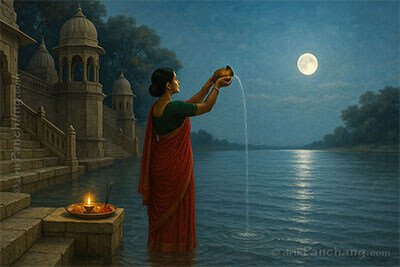
























 Moonrise on Purnima - 07:22 PM
Moonrise on Purnima - 07:22 PMNotes: All timings are represented in 12-hour notation in local time of Oslo, Norway with DST adjustment (if applicable).
Hours which are past midnight are suffixed with next day date. In Panchang day starts and ends with sunrise.
According to Hindu lunar calendar, Shravana Purnima is the fifth Purnima in the year. It holds deep religious, spiritual, and cultural significance for Hindus. This auspicious day is marked by the convergence of several important festivals, rituals, and observances that celebrate devotion, discipline, and divine blessings. Fasting or Upavasa on Purnima is a widely followed tradition among devout Hindus. On Shravana Purnima, many people observe a full day fast even without water or eat only a single meal of fruit and milk. The purpose of fasting is spiritual purification. The fast is broken only after Chandra Darshan. At the end of the fast, Lord Vishnu or Lord Shiva is worshipped, depending on regional practices.
The most popular festival on Shravana Purnima, Raksha Bandhan celebrates the bond between brothers and sisters. Sisters tie a sacred thread i.e. Rakhi on their brothers' wrists, praying for their protection, while brothers vow to safeguard their sisters. The ritual symbolizes love, duty, and mutual respect.
In many regions, rituals for Pitru, i.e. deceased ancestors are performed on this day. Narayana Bali, Shraddha, Tarpana, and Pinda Dana, etc. are conducted to appease ancestral souls, especially in holy places like Gaya, Prayag, Rishikesh and Rameshwaram.
In South India this day is celebrated as Avani Avittam. For Brahmins, especially in South India, Shravana Purnima is the day of Yajurveda Upakarma, the sacred thread changing ceremony. It marks a renewal of spiritual study and Vedic commitments. On this day, men perform rituals to express gratitude to Rishis and resume Vedic education.
In some regions of North and Central India, this day is celebrated as Kajari Purnima. This day is observed by farmers and women praying for good crops. Rituals are performed with symbolic mud pots and sprouted grains.
Shravana Purnima is also celebrated as Hayagriva Jayanti. This day marks the birth of Lord Hayagriva, the horse-headed incarnation of Vishnu, considered the god of knowledge and wisdom. Devotees, especially in Vaishnavism, worship Hayagriva to seek academic excellence and spiritual enlightenment.
Shravana Purnima finds mention in various Puranas and Smriti texts like Skanda Purana, Bhavishya Purana and Garuda Purana. Shravana month itself is considered sacred in the Shiva Purana, where Lord Shiva is extensively worshipped with Bilva leaves and abhisheka. Shravana Purnima is a day that unites diverse customs, faiths, and regions under the shared banner of devotion and tradition. Shravan Purnima is an auspicious day which is filled with various rituals, festivals and celebrations and provides an opportunity to move forward on the spiritual path.